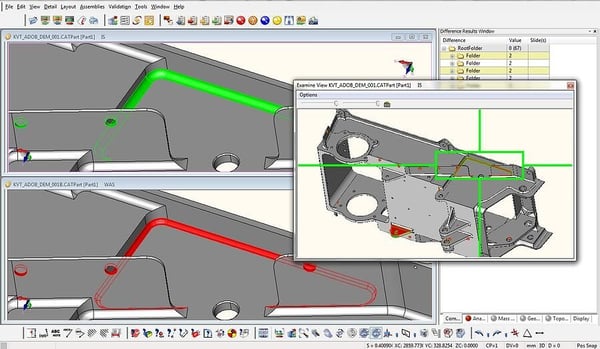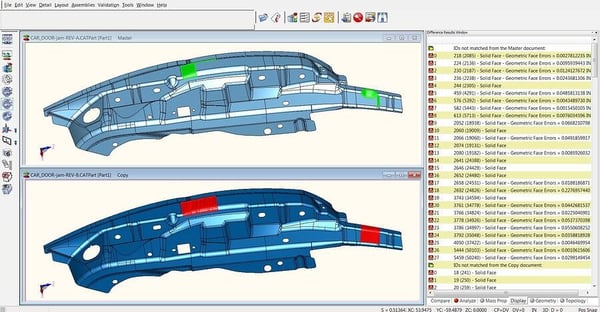For any manufacturer working within the aerospace supply chain, data validation and auditing are a necessary part of the design-to-fabrication process. The need for independent verification, documentation, and traceability back to the CAD model validation are intrinsic to the industry but can potentially cause slowdowns in the workflow. Best practices regarding validation are not always a given and the process, if handled ineffectively, can waste time and money, make auditing a headache, and result in costly errors. It doesn’t have to be that way. With the proper utility, validating CAD model geometry within the digital product definition becomes a quick, seamless process, from verification, to documentation, to audit.
This is a process that Oregon’s Davis Tool, Inc. has learned well. In serving clients across the aerospace, high tech, medical, and consumer products industries, CAD validation has become a regular concern for Davis Tool. It’s grown from a two-person shop in 1980 to the contract manufacturing leader it is today, now operating more than 200,000 square feet of space and employing over 140 manufacturing professionals. With roots in the region’s high-tech industry and capabilities that include laser cutting, punching, forming, turning, milling, and EDM metal removal, Davis Tool manages the entire manufacturing process, from prototype to production.

Davis Tool manages around-the-clock production schedule, turning out anything from simple parts to complex assemblies, and has honed all aspects of its manufacturing process by adopting leading-edge technologies that enable them to keep pace or stay ahead of schedule. When it comes to handling CAD data validation within this schedule, one name has become their clear choice: Kubotek.
Jim S., Mechanical Engineer, PE, handles validation and auditing for Davis Tool. “[Kubotek] is widely recognized in the industry. It’s like: ‘What are you using to do your validation? Kubotek? Great! You meet our requirements,’ and that’s where it stops.”
According to Jim, Davis Tool is often provided with a digital product definition or model-based definition, will translate it into their house CAD format, and from those files create shop drawings and CNC code. For any instance that a translation is performed, Davis’ aerospace customers require that a traceable validation be completed to verify that the end model matches the authority data set.
“The customer sends us a digital CAD file, as opposed to sending us a complete drawing with everything dimensioned. Everything’s embedded in the model. One of the main requirements is proving that the end model matches what was sent to us,” says Jim, “That’s where Kubotek comes in.”
Since Davis Tool does business with a wide range of clients, versatility and interoperability were key factors when selecting a validation utility. Maintaining seats of the full gamut of possible authoring software is costly and unwieldy, making it imperative that the tool be able to handle any CAD format Davis encounters.
“We do get quite a few different formats. CATIA is a large portion of what we receive, along with a lot of SolidWorks, and some customers will send us IGES, STEP, or Parasolid as well,” explains Jim, “One of the beauties of Kubotek is that I can verify that the model I’m checking matches the authority without having to have each customer’s native CAD system.”

How often Jim uses Kubotek Validation Tool depends on the production schedule. It could be multiple times per day or once every few weeks. It’s critical that the utility be easy to pick up and use any time. Davis Tool has used other validation products in the past but found them lacking, specifically when it came to locating and identifying discrepancies. “One of Kubotek’s biggest assets,” according to Jim, “is how it responds when you get a translation that’s not clean, when you have surfaces that fail or disappear. When, say, a little fillet does something strange in the translation you can easily zoom right in and see it. Some of the other systems we’ve had in the past would simply tell you that models either matched or didn’t and give you coordinates. You basically had to go in and start adding points to models to figure out where the problem surface even was. That’s not the easiest thing.” By highlighting differences Kubotek Validation Tool makes it simple to locate them and enables users who may not be familiar with or have access to CAD software to perform the validation procedures.
Clearly identified differences due to translation are just one of the features that make Kubotek Validation Tool easier to use than the competition and the clear choice for Davis Tool. If the copy model has been rotated, the utility will automatically reorient it to match the master. In instances where the receiving software, such as certain inspection utilities, is not capable of outputting a suitable surface model but is capable of outputting points nominal, Kubotek performs the validation with ease.

In addition to ensuring data integrity, a validation utility needs to deliver results during an audit. Jim has found the Kubotek report documentation to be reliable, efficient, and easy to access. The validation reports exist independent of the software and can be opened and utilized by anyone. As a form of quality documentation, Kubotek validation reports meet all aerospace industry requirements. Not only do they provide certified traceability back to the validation for auditing purposes, the software can also rerun and recreate the exact same report. For Jim, this adds up to hassle-free audits every time.
“When we get audited we don’t need to pull in the QA model and go through the entire process. We can just pull up the delivery report summary text file and say, ‘Here you are.’ Anybody can have access to it and open it. They don’t even need to have the software in their system.”
In adopting Kubotek Validation Tool, Davis Tool has set themselves up to meet the strictest of validation standards within the aerospace industry without compromising the efficiency of their workflow. The Kubotek name comes with a proven reputation and the Validation Tool’s documentation simplifies the auditing process for all involved. “For customers using digital product or model-based definition, which is very prevalent in the aerospace, high-tech, and medical industries, validation is a requirement,” remarks Jim. For Davis Tool, no utility has bridged these industry-based requirements and the needs of a modern manufacturing operation as effectively as Kubotek Validation Tool.

